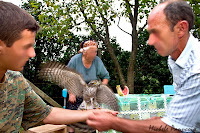In most cases relevant concentrations of migrating raptors are observed close to a natural barrier. But there are places where there are even more barriers. This is the case of Georgia (former Soviet Union) where the white peaks of Caucasus are reflected in the Black Sea. The effect of these two barriers produces an incredible concentration of migrants passing in a narrow slope close to the coastline. Almost one million of raptors and storks migrate through Batumi in the south west of the country. In the early morning it's easy to watch trees with tens of perched raptors, while during the day, as the hours pass, the number of raptors flying toward south increases. In some days the stream of raptors is endless. It would be nice if the story of migration in Batumi was all that. But unfortunately it is not. The other side of the coin is represented by human threats to the bird flight. Tens of hawkcathers set up their nets, agitate linked shrikes, leading sparrowhawks to fall into the trap. They use sparrowhawks to hunt quails and this is partially legal but some of those men capture also Goshawks and Levant Sparrowhawks, and sometimes several individuals a day. This is a traditional hunting activity and there is also something worse, although if it seems impossible. Hundreds of poachers use to shoot raptors close to their houses or along the ridges. They often shoot everything, storks, bee-eaters, eagles. One of them claimed to have killed 18 eagles in one day and another day 40 Honey Buzzards. They often collect just the raptors fallen close to their feet and abandoned the ones at some distance from them. Some of the poachers eat the killed raptors leaving wings, tails, heads on the ground as sign and evidence of their awful activity... How many raptors are shooted every autumn in south-west Georgia? Thousands for sure. Nobody knows what may be the consequences of this detrimental situation for the population of raptors migrating along the eastern coast of Black Sea. A good team of ornithologists and birders are monitoring both migration and poaching, although it is not told how and when this massacre will stop.
(for further informations see this website: www.batumiraptorcount.org).













No comments:
Post a Comment